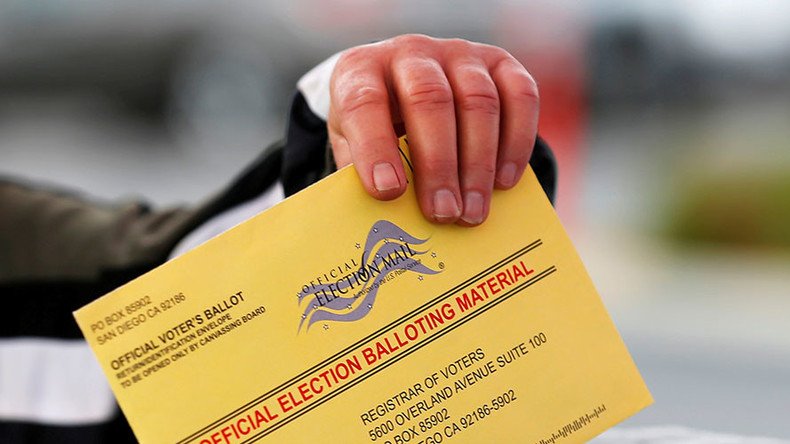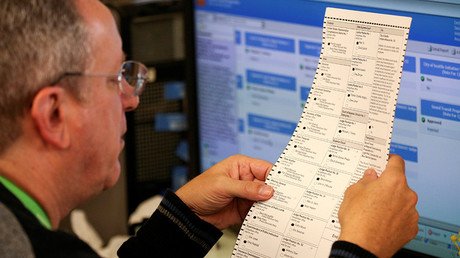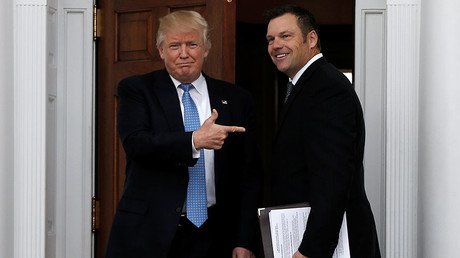Judge allows Trump’s voter fraud commission to collect voter information

A federal judge has rejected a temporary restraining order filed against President Donald Trump’s commission to examine voter fraud, allowing the collection of detailed voter information from states.
In Monday’s ruling, US District Judge Colleen Kollar-Kotelly denied a request to block the Presidential Advisory Commission on Election Integrity from collecting voter information from the states, as long as any information made public by the commission will be “de-identified.”
“Defendants have represented that they are only collecting voter information that is already publicly available under the laws of the states where the information resides; and Defendants have clarified that such information, to the extent it is made public, will be de-identified. All of these representations were made to the Court in sworn declarations, and needless to say, the Court expects that Defendants shall strictly abide by them,” Kollar-Kotelly wrote.
However, Kollar-Kotelly added that “to the extent that factual circumstances change – for example, of the de jure or de facto powers of the Commission expand beyond those of a purely advisory body – this determination may need to be revisited.”
The Electronic Privacy Information Center (EPIC) filed a temporary restraining order and preliminary injunction against the commission five days after they requested voter records from all 50 states. EPIC was attempting to block the commission from gathering voter data until the impact on privacy could be assessed.
The privacy group argued that the commission was putting voters’ information at risk, citing the fact that the commission failed to complete a Privacy Impact Assessment to identify and mitigate privacy risks in their data collection system before making the request.
In the 35-page opinion, Kollar-Kotelly ruled that the commission, which originally asked the states to upload the information to a site hoisted by the Department of Defense, escaped scrutiny when it began using White House servers, which the commission argued are “subject to the security protecting all White House communications and networks.”
"Given the factual circumstances presently before the Court - which have changed substantially since this case was filed three weeks ago - Defendants’ collection of voter roll information does not currently involve agency action," Kollar-Kotelly wrote.
The judge also ruled that the commission and the White House information technology office do not qualify as federal agencies, and therefore do not require a privacy impact assessment.
“Neither the Commission or the Director of White House Information Technology - who is currently charged with collecting voter roll information on behalf of the Commission - are 'agencies” for purposes of the APA [ Administrative Procedure Act], meaning the Court cannot presently exert judicial review over the collection process," Kollar-Kotelly wrote.
In a statement issued Monday, EPIC president Marc Rotenberg said EPIC “will push forward” with its litigation.
“The Commission cannot evade privacy obligations by playing a shell game with the nation’s voting records,” Rotenberg said.
Kansas secretary of state and the vice-chair of the commission, Kris Kobach (R), called the ruling “a major victory for government accountability, transparency and the public’s right to know about the integrity of our elections processes.”
“The Commission requested this publicly available data as part of its fact-gathering process, which is information that states regularly release to political candidates, political parties, and the general public,” Kobach said in a statement. “We look forward to continuing to work with state election leaders to gather information and identify opportunities to improve election integrity.”
Updated with comments from Sec. Kobach #kslegpic.twitter.com/RyCUvVlsmr
— Allison Kite (@Allie_Kite) July 24, 2017
According to EPIC, the commission has only received voter information from the state of Arkansas, which they argued is being held on a server that has not been approved for storing the public’s personal data, and is therefore in violation of both federal and state laws.
However, Kobach told the Washington Times on Monday that several states “have already said they’re standing by, ready to send in the publicly available voter rolls.”
Kobach said that currently about a dozen states have refused to comply with the commission’s request, while 30 have indicated that they will comply with some of the request.
Many of the states that have refused have said that disclosing their voters’ information is against their state laws, while other state leaders have said that the commission is only trying to prove Trump’s claims that millions of undocumented immigrants illegally cast ballots against him in the 2016 presidential election.
Speaking at the first meeting of the commission on Wednesday, Trump said that he wants the commission to approach their task with "a very open mind.”
"If any state does not want to share this information, one has to wonder what they're worried about," Trump said, according to the Associated Press. "There's something. There always is."














